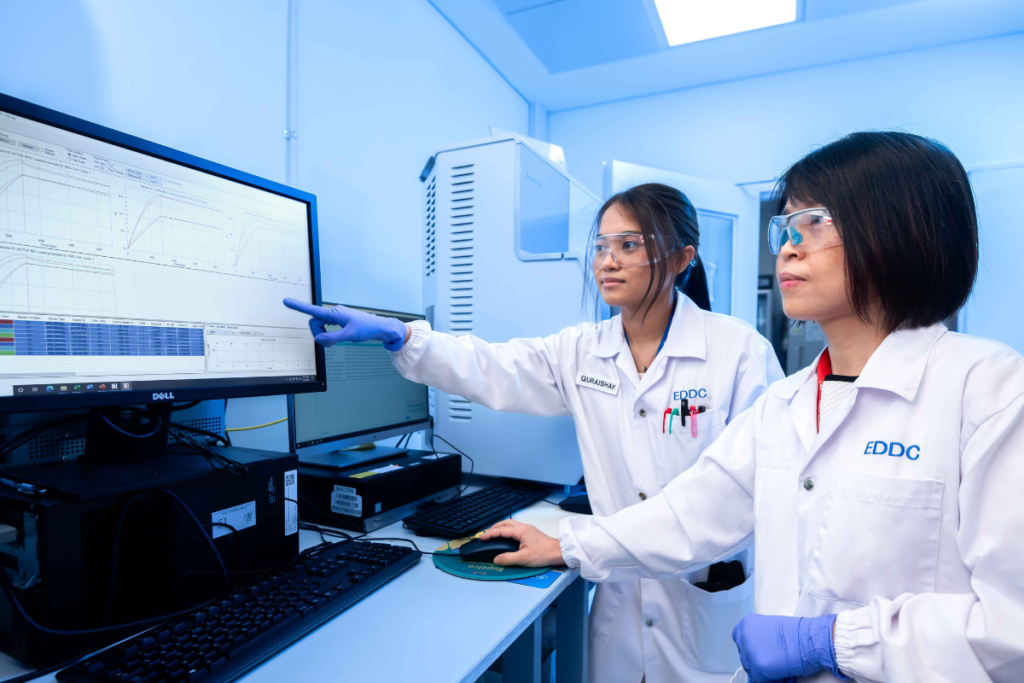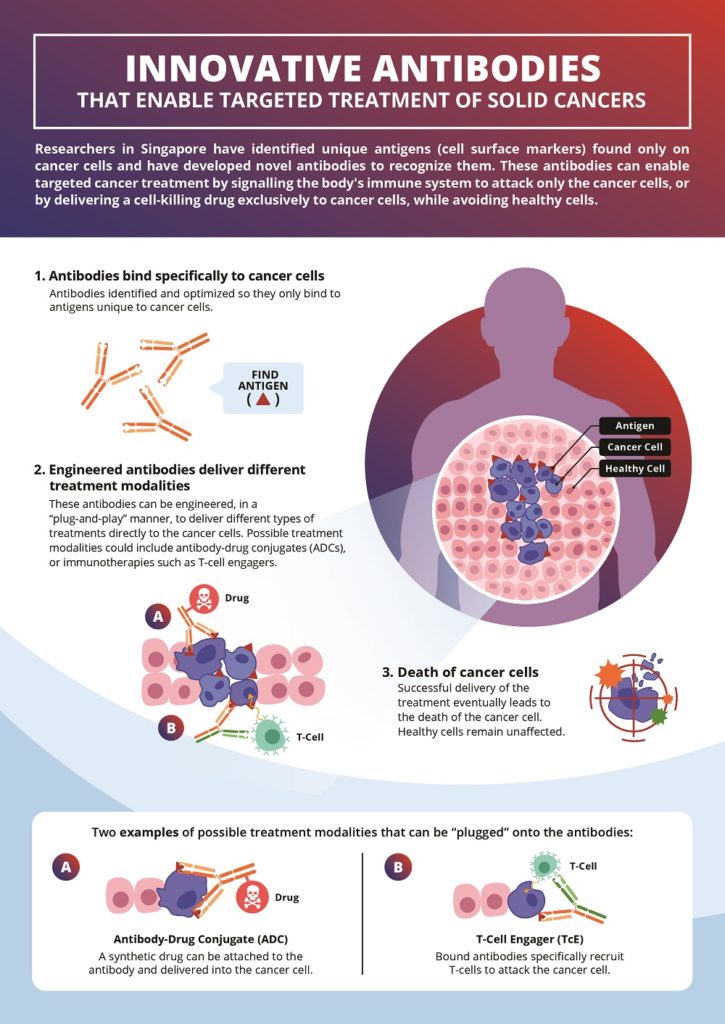The following text is adapted from this press release.
- Boehringer Ingelheim gains exclusive global rights to a panel of cancer-specific antibodies to enable the development of targeted cancer therapies
- These engineered antibodies may allow for specific targeting of tumor cells without binding to healthy cells
- This partnership allows Boehringer Ingelheim to strengthen its tumor cell-directed Antibody-Drug Conjugate (ADC) and immune cell-targeted (T-cell engager) portfolio
Ingelheim, Germany and Singapore, 02 June 2022 – Boehringer Ingelheim and the Agency for Science, Technology and Research (A*STAR) today announced a global licensing agreement under which Boehringer Ingelheim will obtain exclusive worldwide rights to research, develop, and commercialize products based on a panel of innovative, tumor-specific antibodies from A*STAR. Boehringer Ingelheim aims to use these antibodies to direct therapeutic effector mechanisms such as antibody-drug conjugates (ADCs) and T-cell engagers exclusively to tumor cells, and to that end develop a range of highly targeted cancer treatments.
“Boehringer Ingelheim believes that these promising antibodies in-licensed from A*STAR will help us advance potent therapeutic candidates against key molecular cancer targets,” says Clive R. Wood, Senior Corporate Vice President and Global Head of Discovery Research at Boehringer Ingelheim and continues: “We look forward to developing these assets for a broad range of cancers with the goal to deliver breakthrough opportunities for patients.”

Boehringer Ingelheim is pioneering a range of versatile therapeutic platforms in order to develop innovative medicines that target the tumor directly (tumor cell-directed therapies) or that enable the immune system to target the tumor (immune cell-targeted therapies). One tumor cell-directed modality is antibody drug conjugates, which allows for delivery of toxins directly into tumor cells. Another is T-cell engagers facilitating direct contact between T-cells and tumor cells, leading to T-cell-mediated killing of the tumor. Both technologies are directed towards markers on the surface of cancer cells, also known as antigens, in order to attack tumor cells but spare healthy tissues.
The innovative antibodies from A*STAR can potentially enable the development of safer, more efficacious therapies as they selectively bind to antigens that are highly expressed on tumor cells but are absent on normal healthy tissues.
Under the terms of the agreement, Boehringer Ingelheim will be responsible for further research, preclinical and clinical development as well as commercialization of targeted cancer therapies using the antibodies from A*STAR. A*STAR may receive payments totaling >100 million EUR in upfront and success-based development and commercialization milestones.
The technology used to identify the unique A*STAR antibodies resulted from a multi-institutional collaboration in Singapore. A*STAR’s Genome Institute of Singapore (GIS) and Institute of Bioengineering & Bioimaging (IBB) generated antibodies which exclusively target antigens that were initially identified from gastric cancer cells. Experimental Drug Development Centre (EDDC), Singapore’s national platform for drug discovery and development hosted by A*STAR, then optimized the antibodies and confirmed their applicability to a range of other solid cancers. EDDC also demonstrated the utility of these antibodies in directing different therapeutic modalities selectively to cancer cells.

Professor Damian O’Connell, Chief Executive Officer of EDDC, says, “As Singapore’s national drug discovery and development platform, EDDC is proud to translate great science in Singapore into valuable assets that can enable the precise treatment of cancer. We believe that Boehringer Ingelheim, with its broad expertise and technologies, is the right partner to maximize the potential of these antibodies for the development of safer, more targeted therapies for cancer patients.”
Professor Tan Sze Wee, Assistant Chief Executive (Enterprise) of A*STAR, says, “These antibodies were developed in Singapore through close collaboration across multiple institutions. There was also strong support by the Singapore Gastric Cancer Consortium. The agreement is testament to the best-in-class research taking place in Singapore. Cancer is a devastating disease, and we hope the fruits of our research can improve patient outcomes.”
Professor Patrick Tan, Executive Director of GIS, says: “We are excited at this development in the research ecosystem’s continuous inroads in cancer treatments and therapies. IBB developed the initial antibody technologies with the support of GIS and SGCC, who identified the tumor-associated targets, and EDDC who optimized the antibodies. Such multidisciplinary collaborations maximize the value and impact of A*STAR’s research for potential patient outcomes.”
Infographic on how these antibodies enable targeted treatment of solid tumors

About Boehringer Ingelheim
Boehringer Ingelheim is working on breakthrough therapies that improve the lives of humans and animals. As a leading research-driven biopharmaceutical company, the company creates value through innovation in areas of high unmet medical need. Around 52,000 employees serve more than 130 markets in the three business areas, Human Pharma, Animal Health, and Biopharmaceutical Contract Manufacturing. Learn more at www.boehringer-ingelheim.com
Boehringer Ingelheim in Oncology
Boehringer Ingelheim is a family-owned company committed to pioneering treatment advancements in some of the most challenging and most impactful areas of cancer. Our goal is to transform the lives of people with cancer by delivering life-enhancing innovations in areas of high unmet need. Our aspiration is to deliver faster and better treatment options for people with cancer today, tomorrow, and beyond. Our rich pipeline of next-generation oncology treatments is comprised of cancer cell-directed and immuno-oncology therapies, the smart combinations of which may hold the greatest benefit for most patients.
In immuno-oncology, we aim to turn poorly immunogenic “cold” tumors into immunogenic “hot” tumors through complementary platforms, including Antibody Drug Conjugates (ADCs), T Cell Engagers (TCEs), oncolytic viruses, and cancer vaccines. For cancer cell-targeted treatments, we address the key drivers of cancer, e.g., KRAS, p53, ß-catenin and MYC, where there has been no hope for patients for a long time.
We proactively collaborate with patients, advocacy organizations, the world’s leading academic and industry, because we believe together, we can make a bigger impact in transforming the lives of people with cancer
About the Experimental Drug Development Centre (EDDC)
The Experimental Drug Development Centre (EDDC) is Singapore’s national platform for drug discovery and development, formed from the integration of the Experimental Therapeutics Centre (ETC), Drug, Discovery and Development (D3), and Experimental Biotherapeutics Centre (EBC) in 2019. EDDC aims to develop therapeutics and diagnostics that save and improve the lives of patients in Singapore, Asia and around the world. EDDC works collaboratively with public sector and industry partners to translate the great science arising from Singapore’s biomedical and clinical sciences R&D into innovative healthcare solutions.
For more information about EDDC, please visit www.a-star.edu.sg/eddc.
About A*STAR’s Genome Institute of Singapore (GIS)
The Genome Institute of Singapore (GIS) is an institute of the Agency for Science, Technology and Research (A*STAR). It has a global vision that seeks to use genomic sciences to achieve extraordinary improvements in human health and public prosperity. Established in 2000 as a center for genomic discovery, the GIS will pursue the integration of technology, genetics, and biology towards academic, economic, and societal impact.
The key research areas at the GIS include Human Genetics, Infectious Diseases, Cancer Therapeutics and Stratified Oncology, Stem Cell and Regenerative Biology, Cancer Stem Cell Biology, Computational and Systems Biology, and Translational Research. The genomics infrastructure at the GIS is utilized to train new scientific talent, to function as a bridge for academic and industrial research, and to explore scientific questions of high impact.
For more information about GIS, please visit www.a-star.edu.sg/gis.
About A*STAR’s Institute of Bioengineering & Bioimaging (IBB)
The Institute of Bioengineering and Bioimaging (IBB) is a multi-disciplinary research institute under A*STAR that spearheads translational research at the interface of biology, chemistry, physics, engineering, and medicine. IBB’s mission is to develop new technologies and engineering solutions to address health, medical and sustainability challenges. IBB’s research activities are focused on Bioengineering Systems, Biophotonics & Bioimaging, and Biomedical Devices & Diagnostics. The Institute has published numerous papers in leading scientific journals and has filed many patents for its inventions. IBB’s technologies have been commercialized through the establishment of more than 10 spin-off companies.
For more information on IBB, please visit www.a-star.edu.sg/ibb.
View other coverage of the deal here:
- News highlight by A*STAR: https://bit.ly/3tAeLOT
